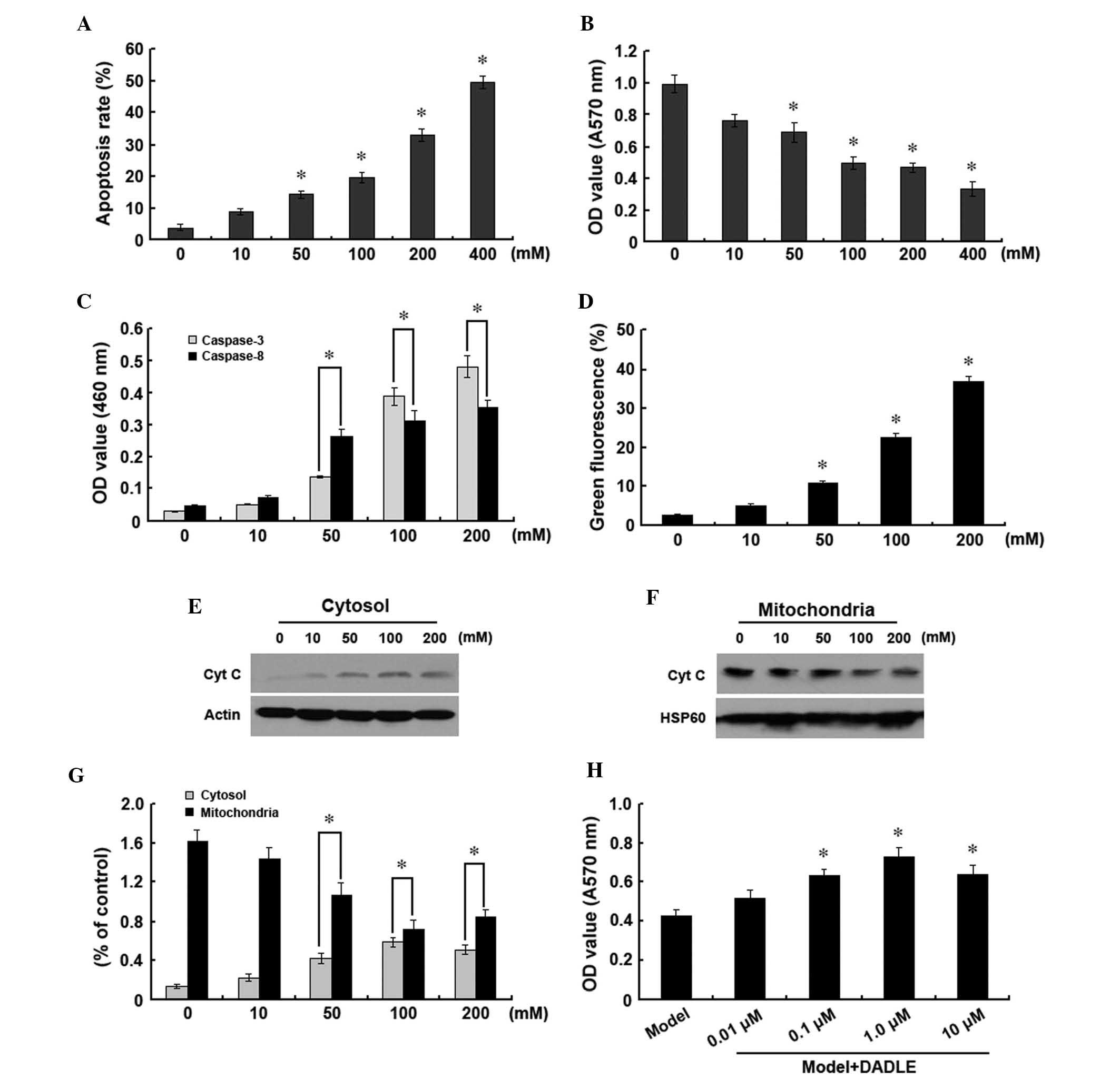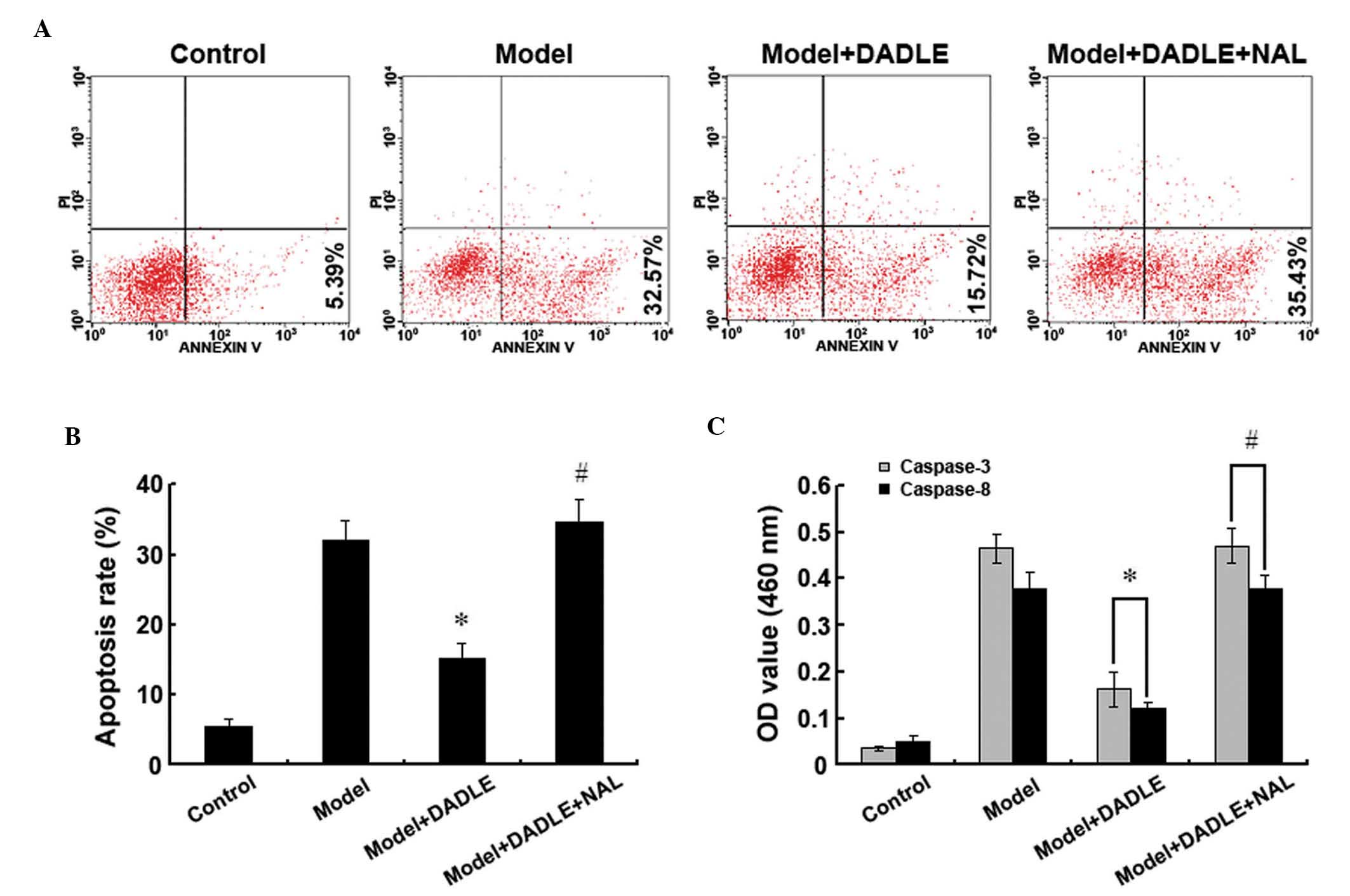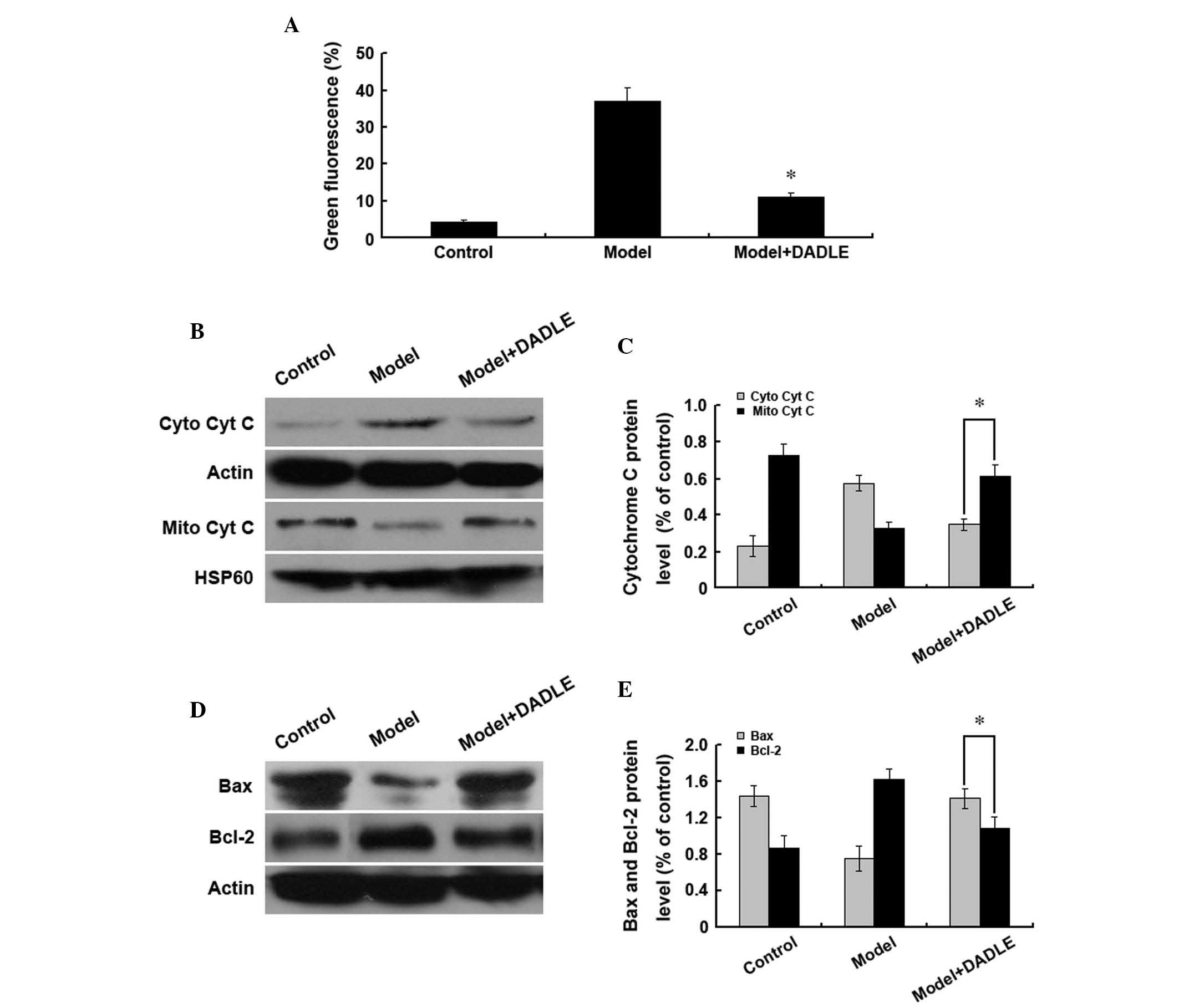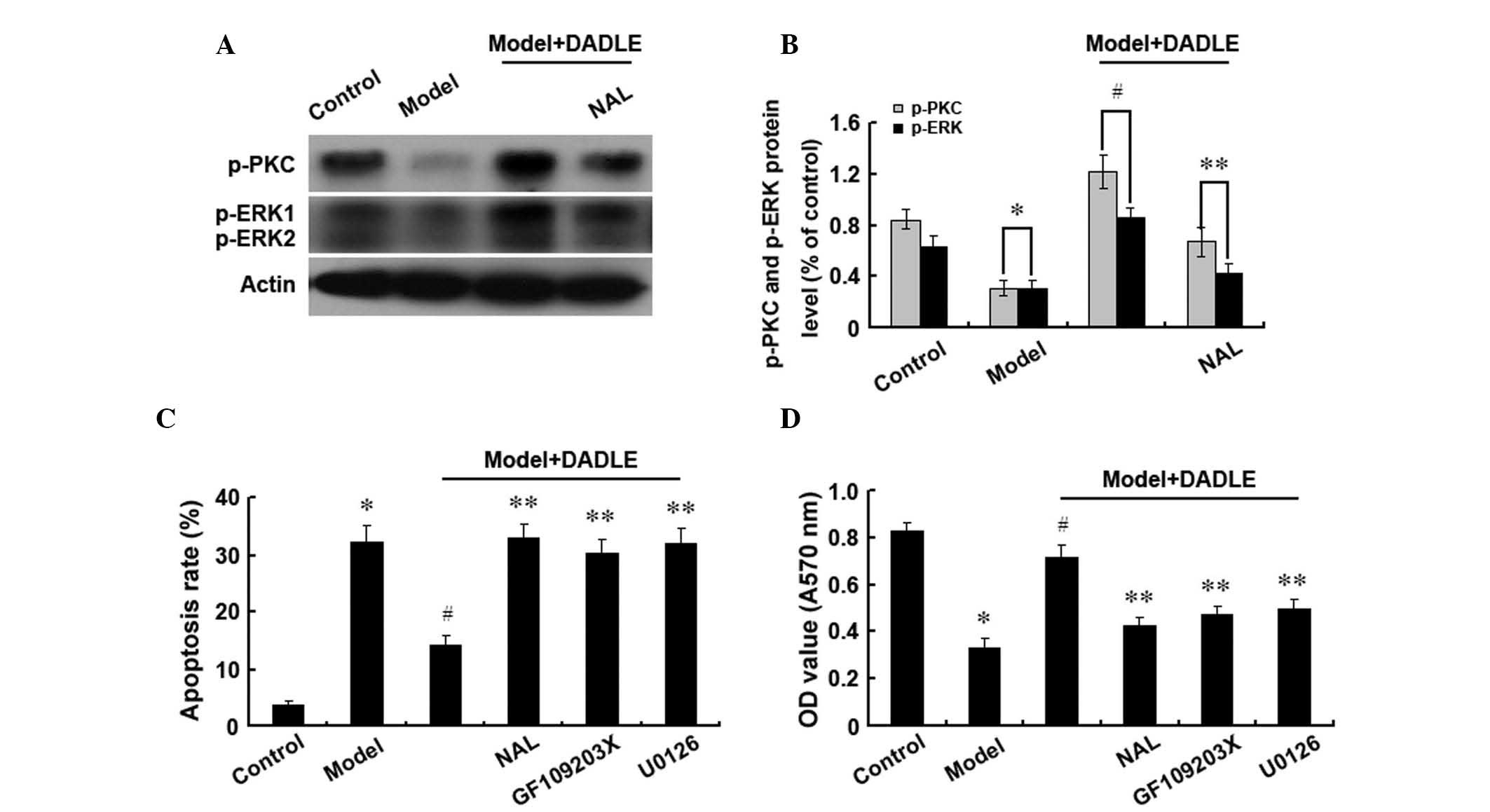|
1
|
Schattenberg JM, Schuchmann M and Galle
PR: Cell death and hepatocarcinogenesis: Dysregulation of apoptosis
signaling pathways. J Gastroenterol Hepatol. 26(Suppl 1): 213–219.
2011. View Article : Google Scholar : PubMed/NCBI
|
|
2
|
Wang D, Wang H, Wu G, Yang Y, Yang J, Liu
C and Wong TM: Protein kinase C mediates the effects of
delta-opioid receptor stimulation on survival and apoptosis in
neonatal cardiomyocytes cultured in serum-deprived condition.
Pharmazie. 64:466–471. 2009.
|
|
3
|
Maslov LN, Barzakh EI, Krylatov AV,
Chernysheva GA, Krieg T, Solenkova NV, Lishmanov AY, Cybulnikov SY
and Zhang Y: Opioid peptide deltorphin II simulates the
cardioprotective effect of ischemic preconditioning: role of
δ2-opioid receptors, protein kinase C, and K(ATP)
channels. Bull Exp Biol Med. 149:591–593. 2010.PubMed/NCBI
|
|
4
|
Wang S, Duan Y, Su D, Li W, Tan J, Yang D,
Wang W, Zhao Z and Wang X: Delta opioid peptide [D-Ala2, D-Leu5]
enkephalin (DADLE) triggers postconditioning against transient
forebrain ischemia. Eur J Pharmacol. 658:140–144. 2011.
|
|
5
|
Tang B, Zhang Y, Liang R, Yuan P, Du J,
Wang H and Wang L: Activation of the δ-opioid receptor inhibits
serum deprivation-induced apoptosis of human liver cells via the
activation of PKC and the mitochondrial pathway. Int J Mol Med.
28:1077–1085. 2011.
|
|
6
|
Neidle A, Manigault I and Wajda IJ:
Distribution of opiate-like substances in rat tissues. Neurochem
Res. 4:399–410. 1979. View Article : Google Scholar : PubMed/NCBI
|
|
7
|
Tang B, Li Y, Yuan S, Tomlinson S and He
S: Upregulation of the δ opioid receptor in liver cancer promotes
liver cancer progression both in vitro and in vivo. Int J Oncol.
43:1281–1290. 2013.
|
|
8
|
Avella DM, Kimchi ET, Donahue RN, Tagaram
HR, McLaughlin PJ, Zagon IS and Staveley-O’Carroll KF: The opioid
growth factor-opioid growth factor receptor axis regulates cell
proliferation of human hepatocellular cancer. Am J Physiol Regul
Integr Comp Physiol. 298:R459–R466. 2010. View Article : Google Scholar : PubMed/NCBI
|
|
9
|
Boyella VD, Nicastri AD and Bergasa NV:
Human hepatic met-enkephalin and delta opioid receptor-1
immunoreactivities in viral and autoimmune hepatitis. Ann Hepatol.
7:221–226. 2008.PubMed/NCBI
|
|
10
|
Erol-Dayi Ö, Arda N and Erdem G:
Protective effects of olive oil phenolics and gallic acid on
hydrogen peroxide-induced apoptosis. Eur J Nutr. 51:955–960.
2012.PubMed/NCBI
|
|
11
|
Hamdi Y, Kaddour H, Vaudry D, Bahdoudi S,
Douiri S, Leprince J, Castel H, Vaudry H, Tonon MC, Amri M and
Masmoudi-Kouki O: The octadecaneuropeptide ODN protects astrocytes
against hydrogen peroxide-induced apoptosis via a
PKA/MAPK-dependent mechanism. PLoS One. 7:e424982012. View Article : Google Scholar : PubMed/NCBI
|
|
12
|
Orrenius S: Mitochondrial regulation of
apoptotic cell death. Toxicol Lett. 149:19–23. 2004. View Article : Google Scholar : PubMed/NCBI
|
|
13
|
Jang Y, Xi J, Wang H, Mueller RA, Norfleet
EA and Xu Z: Postconditioning prevents reperfusion injury by
activating delta-opioid receptors. Anesthesiology. 108:243–250.
2008. View Article : Google Scholar : PubMed/NCBI
|
|
14
|
Raut A, Iglewski M and Ratka A:
Differential effects of impaired mitochondrial energy production on
the function of mu and delta opioid receptors in neuronal SK-N-SH
cells. Neurosci Lett. 404:242–246. 2006. View Article : Google Scholar
|
|
15
|
Baldanzi G, Alchera E, Imarisio C,
Gaggianesi M, Dal Ponte C, Nitti M, Domenicotti C, van Blitterswijk
WJ, Albano E, Graziani A and Carini R: Negative regulation of
diacylglycerol kinase theta mediates adenosine-dependent hepatocyte
preconditioning. Cell Death Differ. 17:1059–1068. 2010. View Article : Google Scholar
|
|
16
|
Saberi B, Shinohara M, Ybanez MD, Hanawa
N, Gaarde WA, Kaplowitz N and Han D: Regulation of H(2)O(2)-induced
necrosis by PKC and AMP-activated kinase signaling in primary
cultured hepatocytes. Am J Physiol Cell Physiol. 295:C50–C63. 2008.
View Article : Google Scholar : PubMed/NCBI
|
|
17
|
Wang Y, Schattenberg JM, Rigoli RM, Storz
P and Czaja MJ: Hepatocyte resistance to oxidative stress is
dependent on protein kinase C-mediated down-regulation of
c-Jun/AP-1. J Biol Chem. 279:31089–31097. 2004. View Article : Google Scholar : PubMed/NCBI
|
|
18
|
Takai S, Matsushima-Nishiwaki R, Tokuda H,
Yasuda E, Toyoda H, Kaneoka Y, Yamaguchi A, Kumada T and Kozawa O:
Protein kinase C delta regulates the phosphorylation of heat shock
protein 27 in human hepatocellular carcinoma. Life Sci. 81:585–591.
2007. View Article : Google Scholar : PubMed/NCBI
|
|
19
|
Sancho P, Galeano E, Estañ MC, Gañán-Gómez
I, del Boyano-Adánez MC and García-Pérez AI: Raf/MEK/ERK signaling
inhibition enhances the ability of dequalinium to induce apoptosis
in the human leukemic cell line K562. Exp Biol Med (Maywood).
237:933–942. 2012. View Article : Google Scholar : PubMed/NCBI
|
|
20
|
Eisinger DA, Ammer H and Schulz R: Chronic
morphine treatment inhibits opioid receptor desensitization and
internalization. J Neurosci. 22:10192–10200. 2002.PubMed/NCBI
|
|
21
|
Hong MH, Xu C, Wang YJ, Ji JL, Tao YM, Xu
XJ, Chen J, Xie X, Chi ZQ and Liu JG: Role of Src in
ligand-specific regulation of delta-opioid receptor desensitization
and internalization. J Neurochem. 108:102–114. 2009. View Article : Google Scholar : PubMed/NCBI
|
|
22
|
Xu C, Hong MH, Zhang LS, Hou YY, Wang YH,
Wang FF, Chen YJ, Xu XJ, Chen J, Xie X, Ma L, Chi ZQ and Liu JG:
Serine 363 of the {delta}-opioid receptor is crucial for adopting
distinct pathways to activate ERK1/2 in response to stimulation
with different ligands. J Cell Sci. 123:4259–4270. 2010. View Article : Google Scholar : PubMed/NCBI
|
|
23
|
Tang B, Zhang Y, Liang R, Yuan P, Du J,
Wang H and Wang L: Activation of the δ-opioid receptor inhibits
serum deprivation-induced apoptosis of human liver cells via the
activation of PKC and the mitochondrial pathway. Int J Mol Med.
28:1077–1085. 2011.
|
|
24
|
Diestel A, Drescher C, Miera O, Berger F
and Schmitt KR: Hypothermia protects H9c2 cardiomyocytes from
H2O2 induced apoptosis. Cryobiology.
62:53–61. 2011. View Article : Google Scholar : PubMed/NCBI
|
|
25
|
Yu H, Liu Z, Zhou H, Dai W, Chen S, Shu Y
and Feng J: JAK-STAT pathway modulates the roles of iNOS and COX-2
in the cytoprotection of early phase of hydrogen peroxide
preconditioning against apoptosis induced by oxidative stress.
Neurosci Lett. 529:166–171. 2012. View Article : Google Scholar : PubMed/NCBI
|
|
26
|
Gao W, Xu K, Ji L and Tang B: Effect of
gold nanoparticles on glutathione depletion-induced hydrogen
peroxide generation and apoptosis in HL7702 cells. Toxicol Lett.
205:86–95. 2011. View Article : Google Scholar : PubMed/NCBI
|
|
27
|
Su TP: Delta opioid peptide[D-Ala(2),
D-Leu(5)]enkephalin promotes cell survival. J Biomed Sci.
7:195–199. 2000.
|
|
28
|
Marzioni M, Alpini G, Saccomanno S, de
Minicis S, Glaser S, Francis H, Trozzi L, Venter J, Orlando F, Fava
G, Candelaresi C, Macarri G and Benedetti A: Endogenous opioids
modulate the growth of the biliary tree in the course of
cholestasis. Gastroenterology. 130:1831–1847. 2006. View Article : Google Scholar : PubMed/NCBI
|
|
29
|
Schultz JJ, Hsu AK and Gross GJ: Ischemic
preconditioning and morphine-induced cardioprotection involve the
delta (delta)-opioid receptor in the intact rat heart. J Mol Cell
Cardiol. 29:2187–2195. 1997. View Article : Google Scholar
|
|
30
|
Pateliya BB, Singh N and Jaggi AS:
Possible role of opioids and KATP channels in neuroprotective
effect of postconditioning in mice. Biol Pharm Bull. 31:1755–1760.
2008. View Article : Google Scholar : PubMed/NCBI
|
|
31
|
Zhao M, Wang HX, Yang J, Su YH, Su RJ and
Wong TM: delta-Opioid receptor stimulation enhances the growth of
neonatal rat ventricular myocytes via the extracellular
signal-regulated kinase pathway. Clin Exp Pharmacol Physiol.
35:97–102. 2008. View Article : Google Scholar : PubMed/NCBI
|
|
32
|
Allen TR, Krueger KD, Hunter WJ III and
Agrawal DK: Evidence that insulin-like growth factor-1 requires
protein kinase C-epsilon, PI3-kinase and mitogen-activated protein
kinase pathways to protect human vascular smooth muscle cells from
apoptosis. Immunol Cell Biol. 83:651–667. 2005. View Article : Google Scholar
|
|
33
|
Agudo-López A, Miguel BG, Fernández I and
Martínez AM: Role of protein kinase C and mitochondrial
permeability transition pore in the neuroprotective effect of
ceramide in ischemia-induced cell death. FEBS Lett. 585:99–103.
2011.PubMed/NCBI
|
|
34
|
Peng Y, Hu Y, Feng N, Wang L and Wang X:
L-3-n-butyl-phthalide alleviates hydrogen peroxide-induced
apoptosis by PKC pathway in human neuroblastoma SK-N-SH cells.
Naunyn Schmiedebergs Arch Pharmacol. 383:91–99. 2011. View Article : Google Scholar : PubMed/NCBI
|
|
35
|
Audet N, Paquin-Gobeil M, Landry-Paquet O,
Schiller PW and Piñeyro G: Internalization and Src activity
regulate the time course of ERK activation by delta opioid receptor
ligands. J Biol Chem. 280:7808–7816. 2005. View Article : Google Scholar : PubMed/NCBI
|
|
36
|
Eisinger DA and Schulz R: Extracellular
signal-regulated kinase/mitogen-activated protein kinases block
internalization of delta-opioid receptors. J Pharmacol Exp Ther.
309:776–785. 2004. View Article : Google Scholar
|
|
37
|
Li R, Yan G, Li Q, Sun H, Hu Y, Sun J and
Xu B: MicroRNA-145 protects cardiomyocytes against hydrogen
peroxide (H2O2)-induced apoptosis through
targeting the mitochondria apoptotic pathway. PLoS One.
7:e449072012. View Article : Google Scholar : PubMed/NCBI
|



















